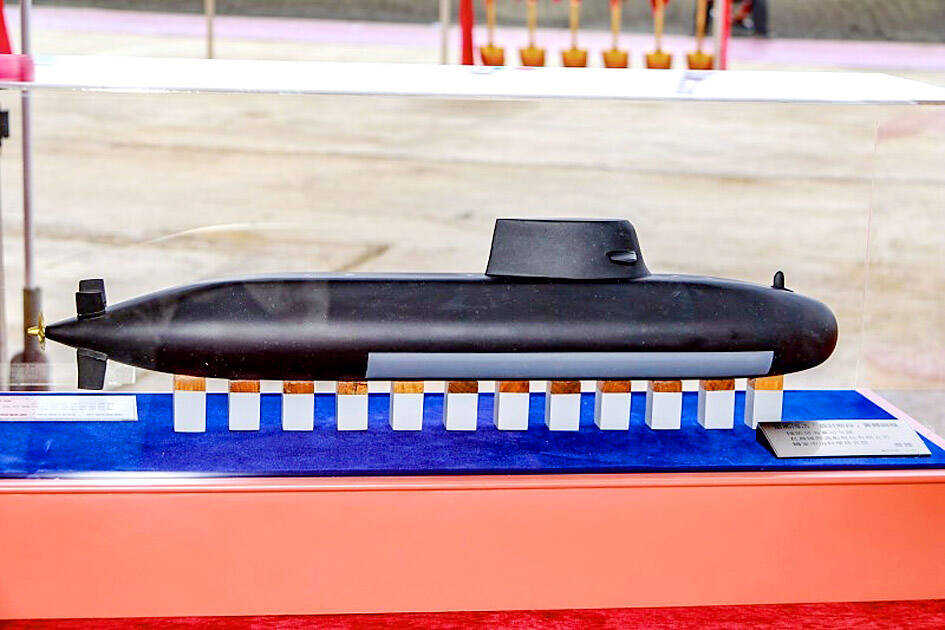A prototype of Taiwan’s first locally built submarine is set to begin testing in September, marking a milestone in the nation’s Indigenous Defense Submarine program, CSBC Corp, Taiwan (台船) chairman Cheng Wen-lon (鄭文隆) said yesterday.
The construction of the prototype has continued around the clock after overcoming a series of difficulties thanks to the cooperation of the Naval Shipbuilding Development Center, the navy’s 256th Submarine Squadron and a CSBC task force, Cheng said.
The government has allocated a NT$49.36 billion (US$1.61 billion) budget over seven years (2019 to 2025) to build a prototype, hoping to launch an indigenous submarine building program that would make Taiwan less dependent on other nations to procure the vessels.

Photo courtesy of the Ministry of National Defense
More than 40 percent of the submarine, including its airtight doors, water conversion system, hydraulic system and silent air-conditioning system, is being manufactured locally, a source familiar with the program said.
Currently, six hull sections have been completed, with only the sail cover section left to be completed, the source said, adding that the ultimate goal is for a submarine cluster to take root in Taiwan so more submarines can be built.
Some “red zone” technologies beyond Taiwan’s submarine design and building capability, such as its diesel engine, torpedo tubes and other combat equipment, have been procured from overseas, the source said.
The Ministry of National Defense has divided the hardware and technologies Taiwan needs for its submarines into red, yellow and green categories, with “red” parts needing to be imported, “yellow” parts that might possibly be made locally and “green” parts that can easily be made in Taiwan.

The Central Election Commission has amended election and recall regulations to require elected office candidates to provide proof that they have no Chinese citizenship, a Cabinet report said. The commission on Oct. 29 last year revised the Measures for the Permission of Family-based Residence, Long-term Residence and Settlement of People from the Mainland Area in the Taiwan Area (大陸地區人民在台灣地區依親居留長期居留或定居許可辦法), the Executive Yuan said in a report it submitted to the legislature for review. The revision requires Chinese citizens applying for permanent residency to submit notarial documents showing that they have lost their Chinese household record and have renounced — or have never

A magnitude 5.6 earthquake struck off the coast of Yilan County at 12:37pm today, with clear shaking felt across much of northern Taiwan. There were no immediate reports of damage. The epicenter of the quake was 16.9km east-southeast of Yilan County Hall offshore at a depth of 66.8km, Central Weather Administration (CWA) data showed. The maximum intensity registered at a 4 in Yilan County’s Nanao Township (南澳) on Taiwan’s seven-tier scale. Other parts of Yilan, as well as certain areas of Hualien County, Taipei, New Taipei City, Taoyuan, Hsinchu County, Taichung and Miaoli County, recorded intensities of 3. Residents of Yilan County and Taipei received

Taiwan has secured another breakthrough in fruit exports, with jujubes, dragon fruit and lychees approved for shipment to the EU, the Ministry of Agriculture said yesterday. The Animal and Plant Health Inspection Agency on Thursday received formal notification of the approval from the EU, the ministry said, adding that the decision was expected to expand Taiwanese fruit producers’ access to high-end European markets. Taiwan exported 126 tonnes of lychees last year, valued at US$1.48 million, with Japan accounting for 102 tonnes. Other export destinations included New Zealand, Hong Kong, the US and Australia, ministry data showed. Jujube exports totaled 103 tonnes, valued at

BIG SPENDERS: Foreign investors bought the most Taiwan equities since 2005, signaling confidence that an AI boom would continue to benefit chipmakers Taiwan Semiconductor Manufacturing Co’s (TSMC, 台積電) market capitalization swelled to US$2 trillion for the first time following a 4.25 percent rally in its American depositary receipts (ADR) overnight, putting the world’s biggest contract chipmaker sixth on the list of the world’s biggest companies by market capitalization, just behind Amazon.com Inc. The site CompaniesMarketcap.com ranked TSMC ahead of Saudi Aramco and Meta Platforms Inc. The Taiwanese company’s ADRs on Tuesday surged to US$385.75 on the New York Stock Exchange, as strong demand for artificial intelligence (AI) applications led to chip supply constraints and boost revenue growth to record-breaking levels. Each TSMC ADR represents